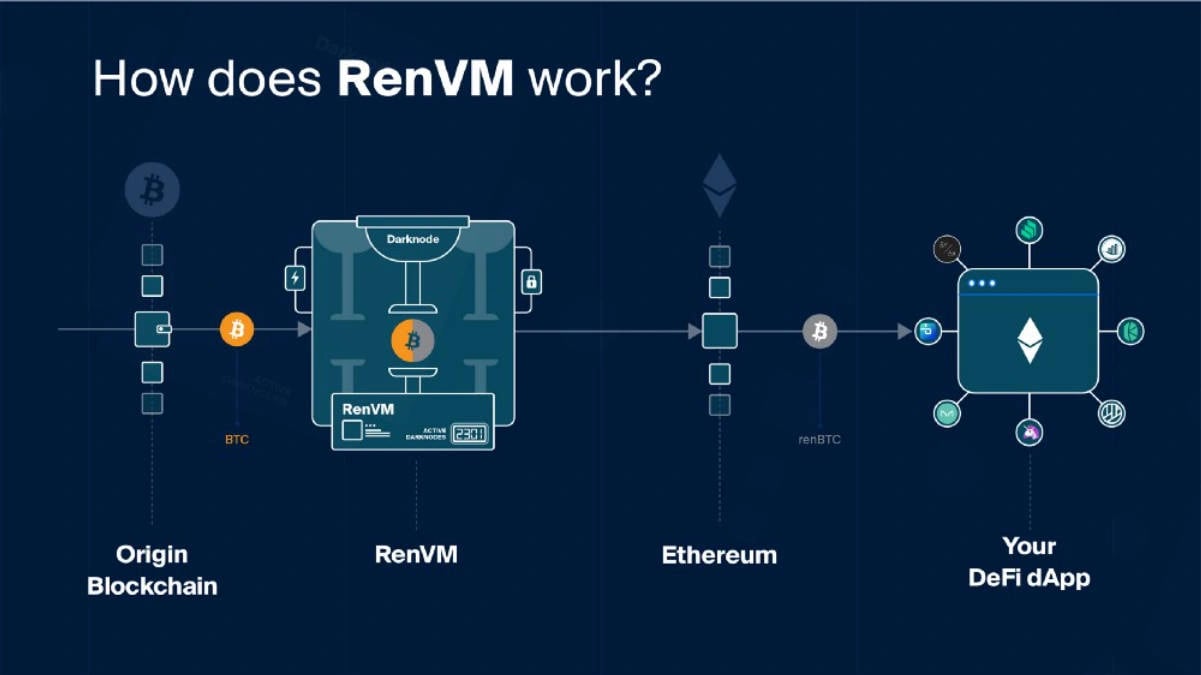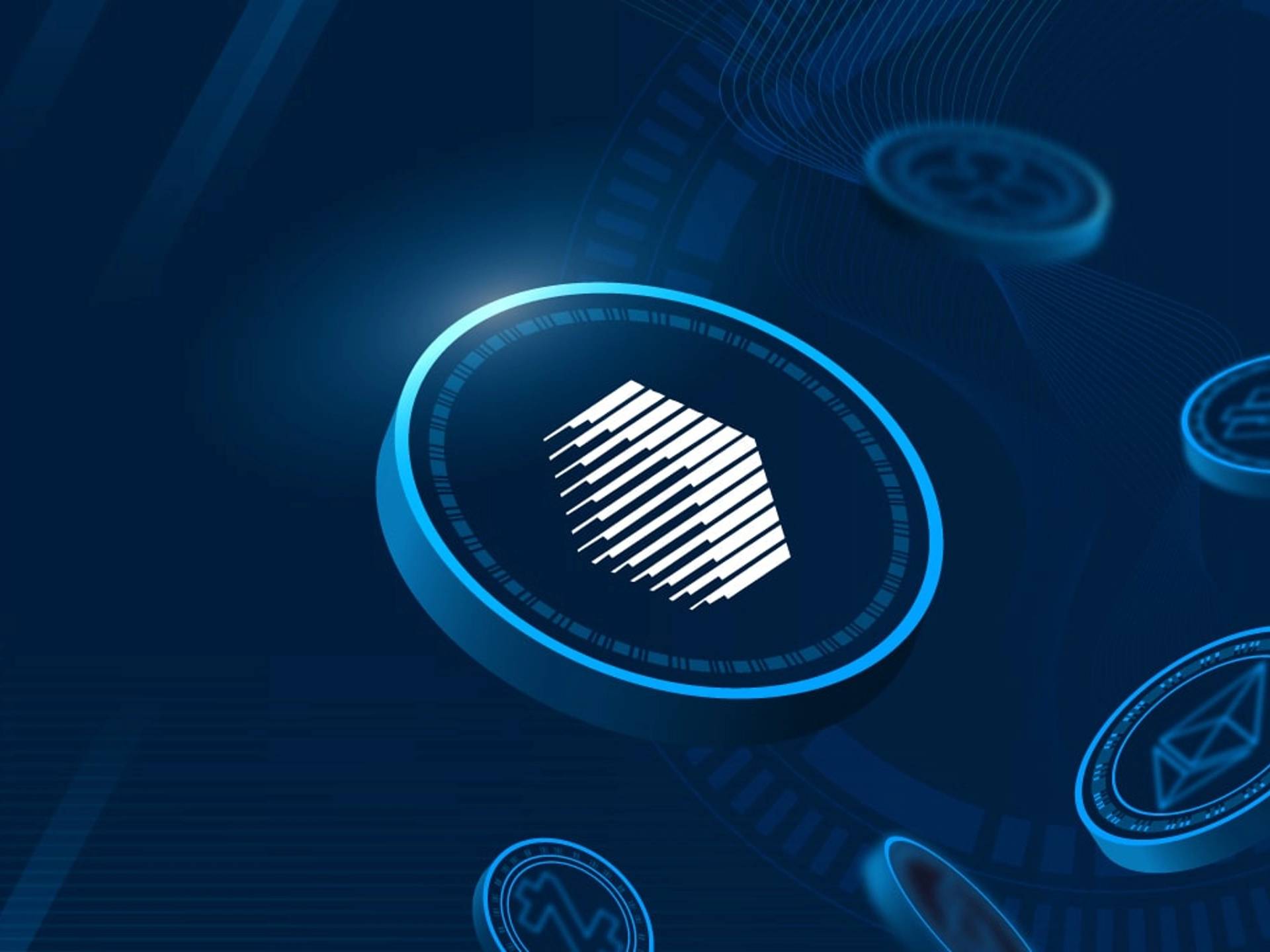위키 구독하기
Share wiki
Bookmark
RenVM
0%
RenVM
RenVM (2020년 출시)은 신뢰가 필요 없고, 허가가 필요 없으며, 탈중앙화된 가상 머신으로, 다양한 프로젝트 DApp, DEX 등 DeFi 생태계에서 탈중앙화된 상호 운용성 솔루션을 제공합니다. 이는 탈중앙화된 블록체인 간의 자유로운 이동을 가능하게 하는 개방형 프로토콜인 Ren에서 개발했습니다[1].
회사
RenVM은 Ren 프로젝트의 제품입니다. 이전에는 Republic Protocol로 알려졌습니다. 이 회사는 2017년 12월에 설립되었으며 싱가포르에 위치하고 있으며 약 50명의 직원을 보유하고 있습니다. 설립자인 Taiyang Zhang은 Ren의 CEO이기도 합니다. 그는 또한 암호화폐 투자 회사인 Virgil Capital의 공동 설립자입니다[2][3][4].
자금 조달
Ren은 두 차례의 라운드에 걸쳐 3,400만 달러 이상의 자금을 확보했습니다. 가장 최근의 자금 조달은 2018년 2월 22일에 초기 코인 공개(ICO) 라운드에서 이루어졌습니다. 투자자 목록에는 Polychain Capital, FBG Capital, Hyperchain Capital, Synapse Capital, Huobi Capital, Limitless Crypto Investments 및 BlockVC가 포함됩니다[5].
개요
소개에서 언급했듯이 RenVM은 다양한 블록체인에 대한 탈중앙화된 상호 운용성 솔루션을 제공하는 엔진 역할을 합니다. 이는 개발자가 크로스체인 기능을 DeFi 애플리케이션에 제공하는 데 도움이 되는 네트워크(및 SDK)입니다. RenVM을 사용하면 DeFi 프로젝트는 다른 블록체인의 유동성을 이더리움 생태계로 가져와 궁극적으로 DeFi 유틸리티를 개선할 수 있습니다. 이더리움과 다른 블록체인 간의 원활하고 탈중앙화된 상호 운용성을 허용하는 기본 크로스체인 사용자 경험을 제공합니다[6].
기술
RenVM은 다음과 같은 주요 역할을 하는 네 가지 기술을 통합합니다.
Shamir의 비밀 공유
Adi Shamir가 만든 암호화 알고리즘입니다. 이 알고리즘은 비밀을 여러 공유로 나누고 비밀 공유 체계의 참가자는 비밀을 재구성하기 위해 대부분의 데이터가 필요합니다.
보안 다자간 계산(sMPC)
RenVM은 신뢰할 수 없는 Darknode가 RenVM을 구동하는 머신을 포함하여 누구에게도 스크립트의 입력 또는 출력을 공개하지 않고 스크립트를 공동으로 실행할 수 있도록 하는 최첨단 sMPC 알고리즘을 개발했습니다.
비잔틴 장애 허용 오차
BFT는 Darknode를 사용할 수 없게 되거나 악의적으로 동작하더라도 RenVM 네트워크를 안전하게 유지하고 실행합니다. 스크립트는 계속 실행되고 비밀은 비밀로 유지됩니다.
하이퍼드라이브
RenVM은 샤딩 및 sMPC를 위해 특별히 설계된 Tendermint 합의 알고리즘의 수정된 버전을 사용합니다.
다크노드
RenVM은 Darknode로 알려진 탈중앙화된 가상 머신 네트워크에 의해 구동됩니다. RenVM 가상 머신은 이를 구동하기 위해 함께 작동하는 수천 대의 머신에 복제됩니다. 이러한 Darknode는 네트워크 대역폭, 계산 능력 및 저장 용량을 네트워크에 제공합니다. 각 Darknode는 네트워크에 기여한 대가로 보상(BTC, ETH, ZEC, DAI 및 ERC-20)을 받습니다.
이러한 Darknode는 RenVM을 계속 실행하기 위해 전 세계의 다른 Darknode와 통신하고 동기화하여 작동합니다. RenVM은 합의 알고리즘에서 실행되므로 누구든지 신뢰할 필요 없이 Darknode를 작동할 수 있습니다.
REN 토큰은 sMPC 네트워크(RenVM)를 구동하는 Darknode를 실행하기 위한 담보로 사용됩니다. Darknode를 실행하기 위한 요구 사항은 담보로 스테이킹된 100,000 REN + VPS를 통해 Darknode 소프트웨어를 실행하는 것입니다. 총 Darknode 수는 10,000개로 제한됩니다(총 Ren 공급량, 즉 1,000,000,000 REN을 Darknode당 필요한 Ren으로 나눈 값과 동일).
| 다크노드 | 주요 숫자 |
|---|---|
| 담보로 필요한 최소 REN | 100,000 |
| 사용 가능한 총 다크노드 수 | 10,000 |
RenBridge
Renbridge를 사용하면 누구나 RenBTC, RenBCH 또는 RenZEC를 발행하거나 해제할 수 있습니다. 사용자는 Metamask 또는 MyEtherWallet과 같은 Web3 지갑을 사용하여 로그인해야 합니다[7].
RenVM 작동 방식

RenVM을 이해하는 가장 쉬운 방법은 먼저 두 개의 다른 블록체인 간에 이동할 때 암호화폐를 보유하는 신뢰할 수 없는 보관인으로 생각하는 것입니다. BTC를 RenVM에 제공하면 해당 BTC를 보유하고 해당 BTC를 이더리움 블록체인에서 1:1 비율로 ERC20 토큰(renBTC)으로 발행하고 renBTC가 항상 동일한 양의 BTC로 뒷받침되도록 합니다. 그런 다음 renBTC를 사용하여 DeFi 생태계에서 교환, 스왑, 활용 및 여러 가지 용도로 사용할 수 있습니다. 간단히 말해서 BTC를 사용하여 이더리움 생태계에 유동성을 추가합니다.
RenVM에서 이더리움에 발행된 모든 디지털 자산은 1:1로 뒷받침되는 ERC20입니다. 즉, 언제든지 1 renBTC를 1 BTC로 쉽게 교환할 수 있습니다. renBTC는 합성 자산이 아니며 청산 메커니즘에 의존하지 않으며 이더리움의 비트코인 가격이 아닙니다. 이는 언제든지 어떤 금액으로든 BTC로 교환할 수 있는 이더리움의 비트코인의 1:1 표현입니다[8].
지원되는 블록체인
현재 RenVM은 비트코인, 비트코인 캐시 및 Zcash를 지원하며 오늘날 대부분의 암호화폐에서 사용하는 타원 곡선 디지털 서명 알고리즘(ECDSA) 개인 키를 사용하는 모든 자산을 지원할 수 있습니다. 멀티체인 모듈은 개발 중이며 RenVM의 다음 릴리스에서는 Acala, 바이낸스 스마트 체인, DigiByte, Dogecoin, Filecoin, Solana 및 Terra에 대한 지원이 제공될 예정입니다(테스트 결과에 따라 다름)[9].
11월 16일, Ren은 RenVM에 멀티체인을 릴리스하고 RenJS 라이브러리를 새로 업그레이드한다고 발표했습니다. 이 릴리스를 통해 새로운 범위의 새로운 자산과 체인이 상호 운용성의 세계에 진입합니다. 이제 개발자는 이더리움 또는 바이낸스 스마트 체인 Dapp에 상호 운용성을 쉽게 가져올 수 있습니다[10][11].
2021년 5월 28일, Ren 팀은 Fantom 네트워크 통합을 발표했습니다. Fantom x RenVM 브리지 지원을 통해 누구나 Fantom 블록체인에서 자산을 발행하고 소각할 수 있습니다. 이는 직접 브리지이므로 사용자는 이더리움 네트워크를 사용할 필요가 없으므로 최소한의 가스 수수료로 Fantom 네트워크로 직접 입출금이 가능합니다. 현재 브리지는 Fantom에서 $renBTC, $renBCH $renDGB $renDOGE $renFIL $renLUNA $renZEC 토큰을 발행하는 것을 지원합니다[12][13].
2021년 6월, 팀은 Avalanche 블록체인에 대한 지원을 추가했습니다. 따라서 누구나 직접 Avalanche x RenVM 브리지를 사용하여 Avalanche에서 $renBTC, $renBCH, $renDGB, $renDOGE, $renFIL, $renLUNA, $renZEC 토큰을 발행하고 소각할 수 있습니다. 사용자는 입출금을 위해 이더리움을 거칠 필요가 없으므로 가스 수수료를 절약할 수 있습니다[14].
| 블록체인 | 암호화폐 | 발행된 ERC20 토큰 |
|---|---|---|
| 비트코인 | BTC | renBTC[15] |
| 비트코인 캐시 | BCH | renBCH[16] |
| Zcash | ZEC | renZEC[17] |
| DigiByte | DGB | renDGB[18] |
| Dogecoin | DOGE | renDOGE[19] |
| Filecoin | FIL | renFIL[20] |
| Terra | LUNA | RenLUNA[21] |
WBTC와의 비교
RenVM은 개념적으로 랩핑된 비트코인(WBTC)과 유사하며 둘 다 동일한 양의 BTC로 뒷받침되는 ERC 20 토큰을 생성하지만 내부적으로는 많은 차이점이 있습니다.
| 유형 | RenVM | WBTC |
|---|---|---|
| 유동적 가치 교환 | RenVM은 탈중앙화된 노드 네트워크(Darknode라고 함)에 BTC를 저장합니다. renVM은 BTC에 대해 즉시 1:1 RenBTC를 발행하고 DeFi에서 사용할 수 있습니다. 중요한 품질은 이 가치 교환(즉, 발행 및 소각)이 빠르고 유동적이며 중앙 집중화, 상인, 서명자 또는 마찰 없이 언제든지 어떤 금액으로든 분당 수백 번 수행할 수 있어 쉬운 크로스체인 이동이 가능하다는 것입니다. | BTC는 중앙 집중식 보관 앱(BitGo)에 저장됩니다. |
| 구성 가능성 | RenVM은 모든 Defi 프로젝트에 통합될 수 있습니다. 최종 결과는 사용자가 DEX에서 BTC를 스왑하고, 대출 플랫폼에서 BTC를 대출/차용하거나, BTC를 사용하여 합성 자산을 담보로 제공할 수 있으며, 실제 BTC만 사용하여 이를 수행할 수 있다는 것입니다. 사용자는 renBTC를 볼 필요가 없거나 경우에 따라 이더리움 자체를 볼 필요가 없습니다. | WBTC는 다른 ERC20 토큰과 마찬가지로 거래할 수 있습니다. |
| 탈중앙화, 신뢰 불필요 및 허가 불필요 | RenVM 내에서 사용되는 ECDSA 개인 키는 Darknode에서도 완전히 비밀입니다. RenVM은 보안 다자간 계산 알고리즘을 사용하여 ECDSA 개인 키로 데이터를 생성하고 서명합니다. 누구도 사용자가 BTC로 renBTC를 발행하거나, renBTC를 소각하여 BTC를 다시 교환하거나, 어떤 방식으로든 renBTC를 사용하는 것을 막을 수 없습니다. | 자산을 보유하고 토큰을 발행하는 키를 보유한 보관 은행을 사용합니다. |
통합
RenVM은 현재 Uniswap, Balancer, Loopring, Virgox, Mooniswap, Kyber Network, Curve Finance 및 1 inch Exchange를 포함한 DeFi 프로토콜에 통합되어 있습니다.
감사
Ren VM은 Chainsecurity 및 RZL의 스마트 계약 및 하이퍼드라이브 감사, ConsenSys Diligence의 MPC를 포함한 여러 감사를 거쳤습니다. 2020년 8월에 Trail of Bits는 예상되는 동작에 대한 문서/지침으로 RZL MPC 논문 및 MPCwiki를 포함하여 RenVM 라이브러리를 감사했습니다. 결과는 만족스러웠습니다[22].
DeFi 통계
RenVM은 DeFi 시장에서 빠른 속도로 성장하고 있습니다. 2020년 5월 27일에 출시된 이후 불과 3개월 만에 총 1억 9,500만 달러를 USD로 잠그고 DeFi 프로젝트 순위에서 9위를 차지했습니다. 2020년 10월 17일에 RenVM은 거래량 10억 달러를 넘어섰습니다. 또한 프로토콜 참가자에게 큰 이정표를 달성하여 Darknode는 5개월 이내에 100만 달러 이상의 수수료를 획득했습니다[23].
개발
2020년 9월 5일, Ren 팀은 Ren이 인기 있는 암호화폐 프로젝트 중 하나인 ChainLink와 협력하여 renBTC, renBCH 및 renZEC로 시작하여 DeFi 생태계로 연결된 크로스체인 자산의 투명성과 감사 가능성을 개선하기 위한 새로운 준비금 증명 합의 메커니즘(테스트넷에서 라이브 및 곧 메인넷)을 개발했다고 발표했습니다[24].
Chainlink의 매우 안전하고 안정적인 탈중앙화된 오라클 네트워크를 활용하여 이더리움 블록체인의 스마트 계약 탈중앙화 애플리케이션(DApp)은 이제 현재 콜레이트를 주문형으로 자율적으로 확인할 수 있습니다.
잘못된 내용이 있나요?
